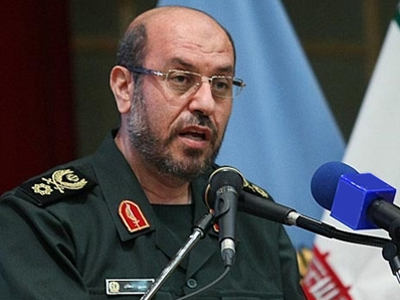November 08-2013

While a huge ideological shift was seemingly made with the election of President Rohani and the naming of his cabinet, the nature of rhetoric by all officials but the president himself is remarkably unchanged.
After years of complaining about American threats to attack Iran, the regime appeared about a year ago to detect a growing fear among the Iranian people. The rhetoric then shifted a bit. Officials still criticized Washington for threatening attack, but an addition to the rhetoric was the assertion that the Americans were all frightened and far too scared to ever actually attack Iran.
That has not changed with the shift in administrations.
Last Tuesday, the new defense minister chosen by Rohani, Hossain Dehqan, proclaimed that Washington is afraid of face-to-face battle with Iran.
“The Americans do not have the courage to put themselves within our bullet-range,” General Dehqan said, addressing the opening ceremony of the 15th Industrial Industries Conference in Tehran.
It was a strange comment given that Iranian military officers often point out—and complain—of how many ships the US Navy has in the Persian Gulf and periodically charges them with violating Iranian territorial waters—clearly within “bullet-range.”
The defense minister said Washington is only left with one option if it ever decides to go to war with Iran and that is to use the Persian Gulf as it cannot stage a ground attack on Iran due to its fear of a face-to-face fight.
That was another oddity of a remark since it ignored the huge volume of missiles, chiefly Tomahawk cruise missiles, that were fired at Iraq from the Indian Ocean. Tomahawks can be fired by airplanes, surface ships and submarines.
Late in September, Rear Admiral Ali Fadavi, the commander of the Pasdar maritime arm that operates in the Persian Gulf but not beyond it, said his speedboats have made the American Navy feel insecure in Persian Gulf waters. It also ignored American long-range bombers and ground attack jets.
Fadavi said, “Our enemies believe that Islamic Iran has acquired deterrent power and it is due to this capability that no move has been made against our country ever since the end of the Iraqi imposed war [on Iran 1980-88].”
He said, “One of the manifestations of this deterrent power is dominating the Persian Gulf.”
But then he asserted, “Even the Americans say that if they withdraw from Europe, they would still have a place for defense, but if they withdraw from the Persian Gulf, they would have nowhere else for defense.” He didn’t cite a source for that quote, which no American military officer would say, as it makes no sense.
The admiral said the US has lost its status as a superpower and controlling the Persian Gulf waterway as the world’s energy lifeline is the only way that the US can show it still has a say in the world. “So they try hard to retain power in this energy corridor, while they are confronting Iran’s power—and the Pasdar speedboats have made them feel insecure,” Fadavi argued.
Last April, Fadavi said the American naval forces need Pasdar permission to pass through the Strait of Hormuz and enter the Persian Gulf. “Today, the Americans admit and acknowledge that the Persian Gulf is under the tight control of the Pasdar maritime arm,” Fadavi said at the time.
“This doesn’t mean inspection (of their ships), but controlling (them). That is to say, they should receive our permission and account to us for any move they want to make,” he explained.
The Strait of Hormuz and Persian Gulf are international waters and no ship requires permission to use them.
While most regime officials stick to the same old rhetoric, President Rohani does not sound anything like his predecessor, Mahmud Ahmadi-nejad. But that is just a shift back to the way things worked before Ahmadi-nejad. Presidents Rafsanjani and Khatami never engaged in anti-Western rhetoric while in office, apparently seeing that as demeaning for Iran. But Rafsanjani gave a long anti-western harangue just days after leaving office in 1997, apparently trying to bolster his credibility with the far right.
